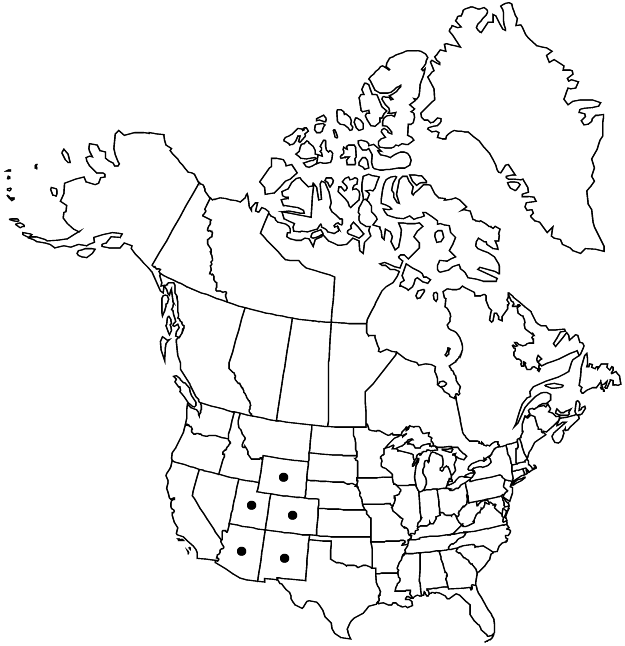Difference between revisions of "Eremogone eastwoodiae"
Novosti Syst. Vyssh. Rast. 10: 139. 1973.
FNA>Volume Importer |
RevisionBot (talk | contribs) m (Bot: Adding category Revised Since Print) |
||
| (3 intermediate revisions by 2 users not shown) | |||
| Line 8: | Line 8: | ||
}} | }} | ||
|common_names=Eastwood’s sandwort | |common_names=Eastwood’s sandwort | ||
| + | |special_status={{Treatment/ID/Special_status | ||
| + | |code=E | ||
| + | |label=Endemic | ||
| + | }} | ||
|basionyms={{Treatment/ID/Basionym | |basionyms={{Treatment/ID/Basionym | ||
|name=Arenaria eastwoodiae | |name=Arenaria eastwoodiae | ||
| Line 30: | Line 34: | ||
-->{{Treatment/Body | -->{{Treatment/Body | ||
| − | |distribution= | + | |distribution=Ariz.;Colo.;N.Mex.;Utah;Wyo. |
|discussion=<p>Varieties 2 (2 in the flora).</p><!-- | |discussion=<p>Varieties 2 (2 in the flora).</p><!-- | ||
--><p>The Hopi Indians may use <i>Eremogone eastwoodiae</i> as an emetic (B. Maguire 1960).</p><!-- | --><p>The Hopi Indians may use <i>Eremogone eastwoodiae</i> as an emetic (B. Maguire 1960).</p><!-- | ||
| Line 62: | Line 66: | ||
|basionyms=Arenaria eastwoodiae | |basionyms=Arenaria eastwoodiae | ||
|family=Caryophyllaceae | |family=Caryophyllaceae | ||
| − | |distribution= | + | |distribution=Ariz.;Colo.;N.Mex.;Utah;Wyo. |
|reference=None | |reference=None | ||
|publication title=Novosti Syst. Vyssh. Rast. | |publication title=Novosti Syst. Vyssh. Rast. | ||
|publication year=1973 | |publication year=1973 | ||
| − | |special status= | + | |special status=Endemic |
| − | |source xml=https:// | + | |source xml=https://bitbucket.org/aafc-mbb/fna-data-curation/src/2e0870ddd59836b60bcf96646a41e87ea5a5943a/coarse_grained_fna_xml/V5/V5_130.xml |
|subfamily=Caryophyllaceae subfam. Alsinoideae | |subfamily=Caryophyllaceae subfam. Alsinoideae | ||
|genus=Eremogone | |genus=Eremogone | ||
| Line 73: | Line 77: | ||
}}<!-- | }}<!-- | ||
| − | -->[[Category:Treatment]][[Category:Eremogone]] | + | --> |
| + | |||
| + | [[Category:Treatment]] | ||
| + | [[Category:Eremogone]] | ||
| + | [[Category:Revised Since Print]] | ||
Latest revision as of 18:07, 6 November 2020
Plants densely matted, green, not glaucous, with woody base. Stems erect, (8–)10–25 cm, glabrous or stipitate-glandular. Leaves: basal leaves persistent; cauline leaves usually in 2–4 pairs, reduced distally; basal blades spreading to recurved, needlelike, 1–3(–3.5) cm × 0.5–0.7 mm, flexuous to rigid, herbaceous, apex spinose, glabrous to puberulent, not glaucous. Inflorescences (1–)3–17-flowered, ± open cymes. Pedicels 3–30 mm, glabrous or stipitate-glandular. Flowers: sepals green or purplish, 1–3-veined, lanceolate to ovate-lanceolate, (3.5–)4–6.5 mm, not enlarging in fruit, margins broad, apex narrowly acute to acuminate, glabrous or stipitate-glandular; petals yellowish white or sometimes brownish to reddish pink, broadly oblong-elliptic to oblanceolate, 4–6.5 mm, 0.9–1.1 times as long as sepals, apex rounded; nectaries narrowly longitudinally rectangular, apically cleft or emarginate, adjacent to filaments opposite sepals, 1–2 mm. Capsules 4–6 mm, glabrous. Seeds brown, ovoid to suborbicular with hilar notch, 1.2–1.7 mm, papillate, subechinate; tubercles conical.
Distribution

Ariz., Colo., N.Mex., Utah, Wyo.
Discussion
Varieties 2 (2 in the flora).
The Hopi Indians may use Eremogone eastwoodiae as an emetic (B. Maguire 1960).
The nectaries in Eremogone eastwoodiae are different from those of most other species of the genus in North America since they are a separate bilobed structure adjacent to, but not a direct enlargement of, the filament bases opposite the sepals.
Selected References
None.
Key
| 1 | Stems and pedicels glabrous | Eremogone eastwoodiae var. eastwoodiae |
| 1 | Stems and pedicels stipitate-glandular | Eremogone eastwoodiae var. adenophora |